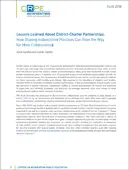This brief describes the landscape of district-charter collaboration efforts and the continuum of costs to implement versus potential benefit to the district and charter sectors and families and students. While the potential impact, especially on families, of a system-wide change such as unified enrollment, is large, the costs of implementation is a considerable barrier for cities that are not positioned to make such a move.
A Strategy to Build Goodwill and Trust Between School Districts and Charter Schools
One strategy cities have used to build goodwill and trust, and establish a proof point for further work, is to start small, which is why many cities approached collaboration through sharing instructional practices. This can take the form of shared professional development programs or shared teacher or leader training pipelines. While not always the highest-impact activity compared to other collaborative efforts, cross-sector practice-sharing can not only set the tone for future work, it can restore an original purpose of charter schools as laboratories of innovation.
Challenges and Opportunities with Sharing Instructional Practices
A CRPE study reveals several promising and well-developed shared instructional practice programs that are building cross-sector trust and showing early positive academic outcomes. CRPE’s research also identifies a number of common challenges and factors for success. Education leaders looking to pursue such efforts must be careful to build strong foundations for successful and sustainable work.




